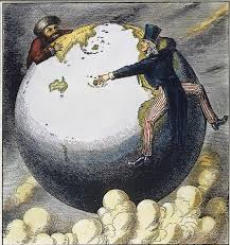
Email: ZYVC057@live.rhul.ac.uk
Total Article : 213
About Me:I'm a graduate student studying International Criminal Law and first started writing for King's News almost 4 years ago! My hobbies include reading, travelling and charity work. I cover many categories but my favourite articles to write are about mysteries of the ancient world, interesting places to visit, the Italian language and animals!

In his treatise, ‘An inquiry as to the nature and causes of the wealth of nations’ Adam Smith sets out to understand the causes of poverty and prosperity in the world. As part of his analysis he provides detailed discussion of the implications of imperialism. The costs of the empire are staggering and actually hinder economic growth. His central argument was a two-pronged public choice critique.
Main benefactors of colonialism were British merchants who sold to colonies for monopoly profits. He saw England would establish these monopoly profits for some merchants in colonies by placing greater import restrictions on competing goods from other foreign entities. According to this logic monopoly trading accrued to merchants while costs fell on citizens of the colonies through the costs of protectionism, and on British citizens who ultimately paid for the establishment of these colonial trade routes. These costs were present in all colonies but Smith spoke about American colonies in greater detail as the costs of preserving the American colonies greater exceeded the benefits.
Public finance. In addition to the costs of protectionism Smith argues that the use of British military to protect the colonies, maintain their safety from outside aggressors and preserve the established trade monopolies would result in ever-increasing expenditures that would burden British citizens. The growing British debt was seen by Smith to be more nuanced then simply pointing out that colonialism is expensive. When undertaking foreign intervention, the political elite would avoid raising taxes to cover the cost of intervention for fear of backlash by the populace so they turn to debt to fund it. The debt however at some point will come due and the elite face the same problem. They will have an incentive to make ‘pretend payments’ through a debasement of the currency.
Displacement argument: subsidising expansion would lead to a distortion in the broader allocation of resources.
Detainment argument: Britain would attempt to maintain colonies by force.
Whilst Smith’s overall position of the British Empire was one of harsh criticism, the same cannot be said for Mill. Though initially he held opinions similar to those of Smith and J. mill on the net costs of colonialism he ultimately shifted his view and rejected smith’s anti-imperialist doctrine.
He offers the first liberal defence of imperialism. Through interlinked political, moral and economic arguments Mill states that British imperial expansion was actually best for serving Britain’s broader interests. Colonisation served a civilising function for much of the world providing benefits for colonised people. His shift from Smith was influenced by his contemporary Edward Gibbon Wakefield who developed a theory of ‘systematic colonisation’. England suffered from excess capital and would result in overproduction if invested domestically. He argued for government to take an active role in allocating land to advantage a superior division of labour. This article has spoken about the theories of two prominent philosophers, both with extremely different views… which of the two men do you think makes the most persuasive and sound argument? Comment below!
Image: http://kingcluthkenar.weebly.com/uploads/1/5/7/2/15728016/9538813_orig.jpg

0 Comment:
Be the first one to comment on this article.